Silicon Valley's hottest start-ups vie for attention
- Published
California's Silicon Valley has done much to earn its reputation as the world's leading technology hub.
Hewlett-Packard, Apple, Google, eBay are among the giants to have flourished in and around the area, while others - including Instagram and Yammer - have become high-priced takeover targets.
The region continues to attract talent and venture capitalists, both keen to be involved in the next big thing.
As a result thousands of start-ups have based themselves in the valley and nearby San Francisco in the hope of attracting investment and attention.
The BBC asked tech writer Laura Locke to attend Techcrunch's Disrupt conference - one of the sector's key events - to identify three businesses creating a stir.
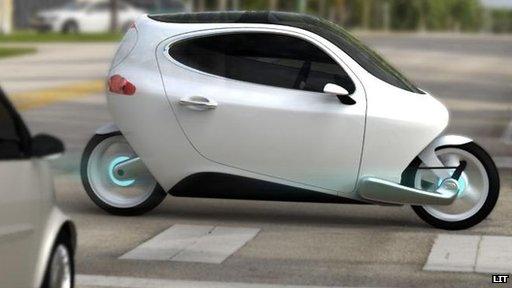
The self-balancing electric motorcycle
"The future of transportation" is how Danny Kim and his engineering team at Lit Motors describe their first-of-its-kind vehicle.
Designed to withstand the brute force of an impact with an SUV (sport utility vehicle), the C-1 is the world's first two-wheeler stabilised by electronically-controlled gyroscopes that create over 1,000 pounds of torque.
That, combined with a set of flywheels, help keep the vehicle upright in challenging conditions including rain, snow, traffic and collisions.
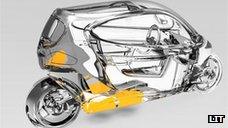
The US authorities still need to certify the vehicle as road-safe
"We developed our own stability algorithm that basically keeps you safe and makes motorcycles accessible to anyone," Mr Kim told the BBC. "All you have to know is how to drive a car."
"Seventy percent of people drive alone," he added, "So, we cut the car in half."
Today's C-1 full-scale prototype resembles a standard motorbike but with an aerodynamic hood that fully encases the driver.
The current version automatically tips 15 degrees without the driver having to lean or tilt sideways. Future versions should automatically tilt up to 45 degrees, noted Mr Kim, who is Lit Motors' founder, president and chief technology officer.
The C-1 may be a cleaner version of its dirty petrol-guzzling cousins but it aims to move much the same way: going from zero to 60mph (96.6km/h) in six seconds, and topping out at 120mph (193.1km/h).
The target is to be able to drive up to 200 miles (321km) on a single charge using a standard electrical outlet, with the cost of each charge being less than a dollar.
Promised safety features include air bags, seat belts, a roll cage, and steel reinforced doors.
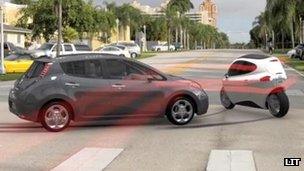
The C-1 is designed to stay upright even if it is hit by another vehicle
A mass-market version is expected to arrive in 2014 and sell for $24,000 (£14,792) - or $19,000 after the federal EV (electric vehicle) tax credits kick in, Mr Kim told the BBC.
Later, once the C-1 achieves commercial scale, the price could drop to $12,000 in the US and $8,000 in India and China, he speculated.
Lit Motors is attempting to raise $20m, more than half of which will go toward crash-testing.
At Peak Oil, an online forum for discussing hydrocarbon depletion, some sceptics questioned the pricing of C-1's all-electric motorbike.
One user wrote: "The Lit cycle is cool, but like electric cars it's too expensive for most folks, who will probably be forced to downgrade to cheap scooters and inexpensive motorcycles like those that already exist."
But - if the product makes it to market - it looks to have at least one guaranteed customer.
Kevin Rose - founder of the Digg news site and now a partner at Google Ventures has said he planned to make a deposit.
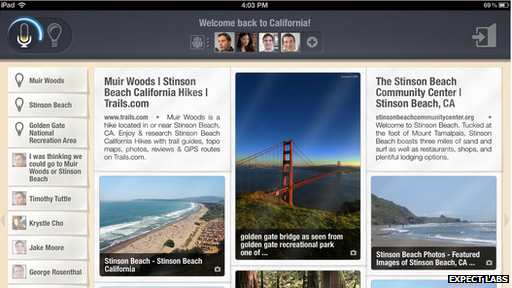
The "anticipatory" chat app
Serial entrepreneur Tim Tuttle thinks he knows what conversations of the future of will look and sound like.
He and his team of computer engineers at Expect Labs, a San Francisco start-up, have spent the past two years building an "anticipatory computing engine" - a platform for applications that predicts what people want or need before they explicitly ask or search for it.
Its first app for the iPad is MindMeld, a group voice and video-calling app that analyses what's being talked about in real-time and "predicts" the type of information participants may want or need, pushing it to their tablets within seconds.

MindMeld listens to its users' conversation and brings up related information
For example, let's say, several co-workers are planning to meet up for bar snacks after work.
Depending on what types of food, drinks and possible meeting places are mentioned, MindMeld "listens" in the background and pulls up pertinent restaurant suggestions, reviews, maps, images and phone numbers using data from across the web and social networks.
The app is also designed to counter forgetfulness by delivering background information about the people on the call or those being discussed.
The core technology allows users to "just glance down and jog your memory so you don't look stupid in the conversation," said Mr Tuttle, co-founder and chief executive of Expect Labs.
It "annotates and bookmarks the most important parts of a conversation," he added.
The entrepreneur holds a PhD from MIT's Artificial Intelligence Lab, and in 2004 helped create Truveo, a video search engine which he later sold to AOL.
Mr Tuttle said the new app was due for release in October and would initially only feature voice calls. He intends to add video before the end of the year.
"Ten years from now, this is going to be standard on every phone call," Mr Tuttle told the BBC.
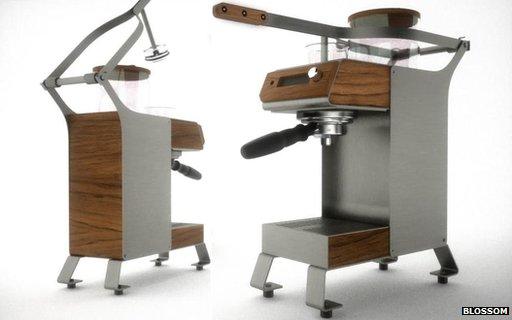
The $10,000 coffee machine
"Do you like coffee? Ever had a cup from a machine that costs about $10,000? Now's your chance... It's the best cup you've ever had - guaranteed."
Blossom's pitch attracted throngs of conference-goers from venture capitalists to budding entrepreneurs and reporters hoping to taste its "insanely great" cup of coffee.
The portable machine behind the brew was built from scratch in a San Francisco warehouse for hardware startups by mechanical engineers and industrial designers with experience working at technology namesakes like NASA, Apple, Tesla, and BMW.
The founders set out to see if they could deploy hardcore science and engineering to outdo hand-crafted brews.
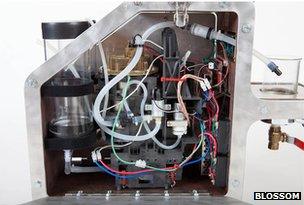
The Cafe1 is designed to ensure coffee is brewed exactly the way each roaster recommends
Their invention, the Cafe1, precisely controls brewing time and temperature to the point where "drastically" different cups of coffee can be elicited from the same beans.
The machine includes a QR barcode scanner and wi-fi connectivity so roasters can place an internet link on their bags which will be recognised to identify the best way to brew each mix of beans.
The first limited production run is just 10 machines which will sold for $11,111. These are aimed at commercial establishments as opposed to consumers.
Jeremy Kuempel, president of Blossom Coffee, acknowledged the price could preclude his dream of "making excellent coffee available to everyone".
But he asserted it would pay for itself within a year of consistent use.
"Blossom Coffee is about more than one machine," he said.
"We are committed to bringing our technology to more accessible levels."
And in the future, he added, "you might be seeing a new price."
- Published17 August 2012
- Published3 August 2012
- Published20 July 2012
- Published25 May 2012
- Published9 May 2012
- Published20 March 2012
- Published8 March 2012